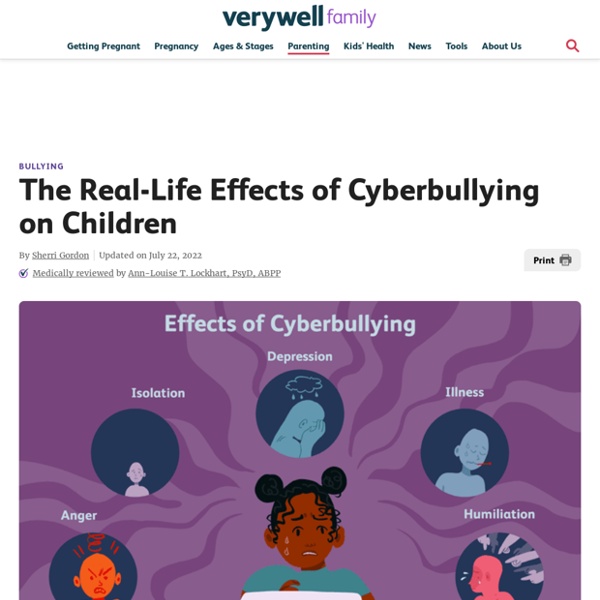The Effects Of Cyber-Bullying On Social Media
Social Media is one of the primary ways most people communicate in the modern age, and it does have its advantages: being able to talk to your friends and see interesting things they post, catching up with what the latest celebrity is doing. While I praise the internet and would not probably be able to survive without it, but unfortunately it has opened up a portal to a new form of bullying that has devastating effects. Cyber-bullying has personally led to me to emotional trauma as well as eating disorders. Bullying is more than just kids picking on kids on the playground. Cyber-bullying is a dangerous thing and it needs to be stopped.
Cyberbullying - National Bullying Prevention Center
Just as the use of technology itself has evolved, so has the ability to bully. Bullying, once restricted to the school or neighborhood, has now moved into the online world. Bullying through the use of technology is referred to as “cyberbullying.” Cyberbullying is the use of technology to repeatedly and intentionally harass, hurt, embarrass, humiliate, or intimidate another person. As adults, thinking back, it was just a generation ago that kids and teens were asking their parents for a phone in their room — maybe even one with a separate line or three-way calling — so they could easily and somewhat privately connect with more friends.
What Is Cyberbullying? Facts, Laws & Resources
The internet is a defining factor of modern education. In fact, education has become more accessible and widespread than ever before because of the internet. From using digital textbooks to earning a degree online, more classroom functions and student experiences are moving into cyberspace — including, unfortunately, bullying. Despite all the good that the internet has brought to students, parents, and teachers alike, there are people who use it with malicious intent. And just as bullying has existed since the dawn of time, virtual bullying has existed since the beginning of the internet. This guide on what cyberbullying is from Maryville University Online will help you learn everything you need to know about cyberbullying, from relevant facts and statistics to helpful resources, so you can keep your teen safe online.
Cyberbullying
For the Wikipedia guidance essay, see Wikipedia:Cyberbullying. Cyberbullying is the use of Information Technology to harm or harass other people in a deliberate, repeated, and hostile manner.[1] According to U.S. Legal Definitions, Cyber-bullying could be limited to posting rumors or gossips about a person in the internet bringing about hatred in other’s minds; or it may go to the extent of personally identifying victims and publishing materials severely defaming and humiliating them.[2] With the increase in use of these technologies, cyberbullying has become increasingly common, especially among teenagers.[3] Awareness has also risen, due in part to high profile cases like the Suicide of Tyler Clementi.[4] Definition Legal definition
Cyberbullying: What is it and how to stop it
3. Who should I talk to if someone is bullying me online? Why is reporting important? If you think you’re being bullied, the first step is to seek help from someone you trust such as your parents, a close family member or another trusted adult.
What Is Cyberbullying
El ciberacoso es el acoso que tiene lugar en dispositivos digitales, como teléfonos celulares, computadoras y tabletas. El ciberacoso puede ocurrir mediante mensajes de texto, textos y aplicaciones, o bien por Internet en las redes sociales, foros o juegos donde las personas pueden ver, participar o compartir contenido. El ciberacoso incluye enviar, publicar o compartir contenido negativo, perjudicial, falso, o cruel sobre otra persona. Esto puede incluir compartir información personal o privada sobre alguien más, provocándole humillación o vergüenza. Algunos acosos por Internet pasan a ser un comportamiento ilegal o criminal. Los lugares más comunes donde ocurre el ciberacoso son:
Mobbing på nett og mobil - Redd Barna
Mobbing Mobbing og plaging i sosiale medier og på nettet er like alvorlig som når det skjer andre steder. At mange kan se det som publiseres, kan gjøre det ekstra tøft. Digital mobbing er ofte godt skjult for foreldre, men veldig synlig for jevnaldrende. i alderen 9-18 år har opplevd at noen har vært slemme eller mobbet dem på internett, spill eller mobil av barn og unge i alderen 9-18 år har vært utsatt for en eller annen form for utestengning på nett
Hva vet vi om digital mobbing?
Mobbing kan foregå via digitale plattformer som for eksempel meldinger, spill og sosiale medier. Dette kaller vi digital mobbing. Publisert: 06. aug 2020 Endret: 23. Mar 2021



